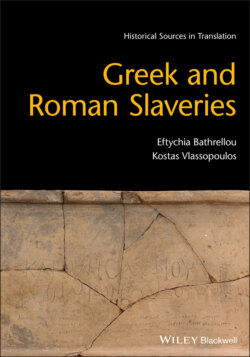Читать книгу Greek and Roman Slaveries - Eftychia Bathrellou - Страница 74
2.24 Theodoret, Religious History, 9.9: Greek Biography of Ascetics (Fifth Century CE)
ОглавлениеAt this part of his biography of Peter of Galatia, an ascetic active in the early fifth century CE, Theodoret narrates events connected with the relationship between Peter and Theodoret’s own mother, a wealthy woman of Antioch.
Literature: Klein 1982.
At another time, my mother took a slave cook who was being perturbed by an evil demon to Peter, and begged for his help. The divine man prayed and ordered the demon to reveal the cause of his power over this creature of God. And he, like a murderer or a robber standing before the court and ordered to speak of his crimes, started to go through everything, forced by fear to tell the truth, although this was not his habit. So, he was saying that in Heliopolis the slave’s master had fallen ill and, since he was ill, the mistress was sitting by her husband’s side. And the slave girls of the mistress of the house in which they lived were relating the lives of the monks who led philosophical, ascetic lives in Antioch and of the great power they have against demons. Then the slave girls, like children playing and having fun, pretended to be possessed by demons and to have gone mad, while that slave, draped in a coat, pretended to exorcise them in the way of the monks. “During this performance,” the demon said, “I was standing by the door and could not bear those boastful stories about the monks. So, I wanted to test the power the slaves impetuously claimed the monks had. With this in mind, I left the slave girls alone and entered this man, wishing to find out how I might be expelled by the monks. But now I have indeed found out and had enough of tests. So, I will immediately come out of him, upon your command.” Upon saying these words, the demon started to flee, whereas the slave cook to enjoy his freedom.
What activities among slaves does the story report?
What is the relationship between slaves and Christianity as depicted in this passage?
Who narrates the events which took place at Heliopolis? How does this affect the veracity of the story?
Can we take this story at face value? Or is this a fantasy of what masters thought slaves might be doing behind closed doors?
What freedom did the slave cook start to enjoy at the end?
